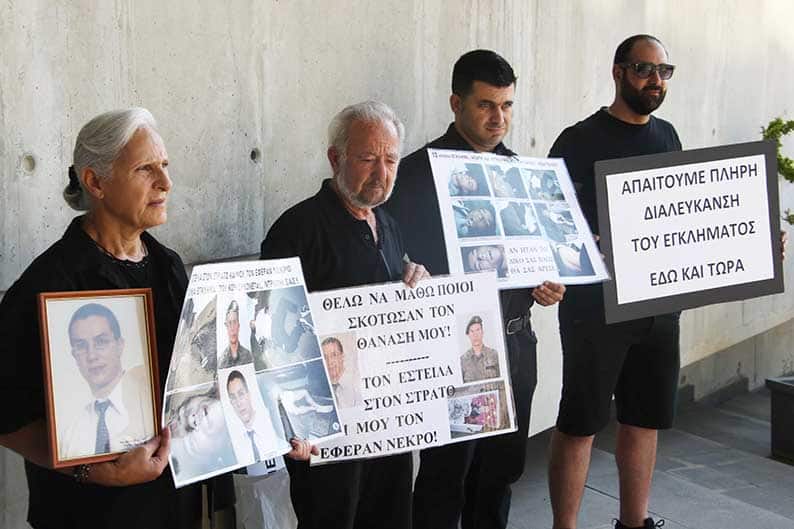It took 17 years for the state authorities to establish that a 26-year-old National Guard conscript, Thanasis Nicolaou, found dead on the dry riverbed under Alassa bridge, had been strangled. When his body was found on September 29, 2005, the police gave the cause of death as a fall from a height and put it down as a suicide.
There was no evidence to support the police theory. There had been no investigation of the scene, no forensic tests, no questioning of conscripts serving with him, but just some guesswork, the authorities content to close the case as fast as possible. Had it not been for the unrelenting efforts of the conscript’s grief-stricken mother to shed light on the case because she refused to accept the suicide verdict, we would never have known what had happened to the young man.
On Thursday the report of the latest criminal investigation into the death, which found that criminal acts had been committed, was handed to the attorney-general. Media reports suggested that the botched investigation had been linked to three police officers and a civilian (the state pathologist that messed up the post-mortem). The findings of the investigation are similar to the ruling of the European Court of Human Rights, the decision of which said that “domestic authorities failed to carry out an effective investigation into the circumstances surrounding Mr Nicolaou’s death.”
There had been an earlier criminal investigation that had suggested a possible crime may have been committed, but the police that had also carried out its own probe ignored it. Everything changed when at the end of 2020 the family secured a court order for the exhumation of Thanasis’ remains, which were sent to Greece for examination and it was discovered that his hyoid bone had been broken, something that could only result from strangling.
Was the claim of suicide by the police the result of abject incompetence, total lack of professionalism or a cover-up? One of the criminal investigators said on Friday, given the scale of the negligence of the police investigations, that it could have been a cover-up. If Thanasis had been strangled, there was a perpetrator who may have pulled some strings to cover up the crime. Whatever the explanation – corruption, incompetence, professional ineptitude – it is a damning indictment of the police and national guard, which did not bother with its own investigation despite the fact that Thanasis had reported that he was a victim of bullying at his camp.
It would be an understatement to say the gross indifference to the death of a young man, dutifully doing his military service, by police, the national guard and the ministry of defence was disgraceful. It was criminal negligence, betraying a shameful contempt for the conscript and his family that had every right to know what had really happened to him.
The investigation, in fact was carried out by an officer at Lania police station, without experience of such cases and no support. Had the victim been the son of a well-connected or wealthy family, would the authorities have been in such a rush to close the case as a suicide, without evidence to justify the verdict and after an investigative procedure that could only be described as a sham? The fact the criminal investigators suggested three police officers were culpable for the botched investigation proves the point.
We like to boast that we have rule of law in Cyprus, but authorities do not seem to realise that this also means all citizens are equal before the law and all state institutions have a constitutional obligation to treat everyone equally. In the case of Thanasis, 26, who had returned to the country from Australia and was doing his military service in order to settle here, the police force decided his death was not worth investigating and neither did the national guard in which he was serving and to which he had reported he was being bullied.
The possibility of a cover-up, the investigator mentioned, would only confirm that not all citizens are treated equally by the authorities. Thanasis was from a modest family without connections or influence whereas the perpetrators of the crime may have been citizens with power and influence. This, admittedly, is conjecture, but it is not outside the realms of possibility given the way our authorities operate.
The incompetence and/or corruption of the police were exposed by the formidable mother of Thanasis, Andriana, who refused to accept the findings of the sham investigation and fought the system for 17 years, never giving up, until she was vindicated. Of course, the perpetrators and moral instigators of the crime still roam free, and the attorney-general will now be under pressure to open a new investigation. He has explained this would be very difficult 17 years after the event and no available evidence, but there is no choice.
There must be an investigation to find the perpetrators, however difficult this might be, because it is the least the state can do after the disgusting way in which the authorities treated Thanasis’ family.







Click here to change your cookie preferences